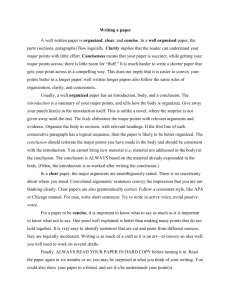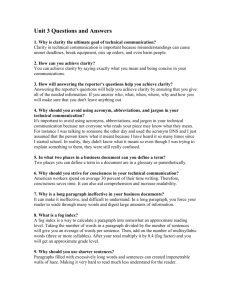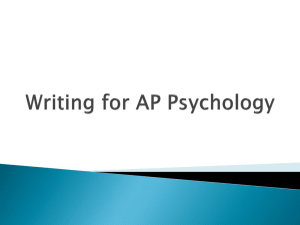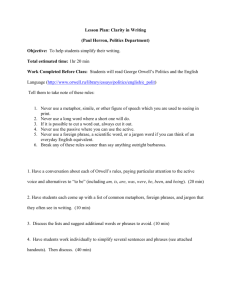Introtoacademicwriti..
advertisement
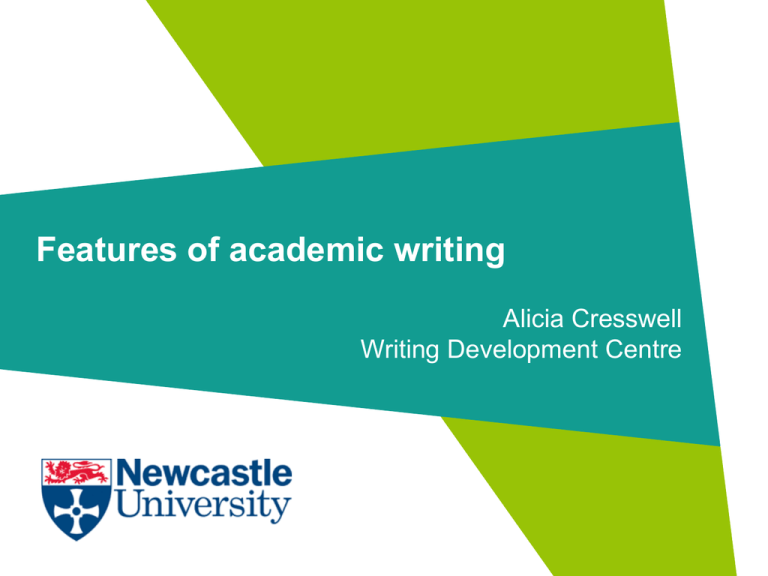
Features of academic writing Alicia Cresswell Writing Development Centre Good academic writing is: explicit clear concise formal in language and style precise in expression and choice of words Explicitness and flow Good writers anticipate their readers’ needs/questions To achieve this: Present general information first (General Specific text structure) Present known information first (Given New information structure) Use signposts to guide the reader through sections of the work and to link sentences and paragraphs Explicitness and flow: GeneralSpecific structure Low density-lipoprotein subclasses in children under 10 years of age Low-density lipoprotein (LDL) particles are heterogeneous, with many subgroups identifiable on the basis of density, size and chemical composition. Distinct subclasses of LDL have been delineated by density as determined by ultracentrifugation, and by size based on non-denaturing polyacrylamide gradient gel electrophoresis. At least two systems of classification are in use: (i) a numerical one based on density, ranging from 1 (large) to 7 (very small); and (ii) a dichotomous system based on mobility on electrophoresis, which divides LDL into two classes, small dense (pattern B), and large buoyant (pattern A). Gel electrophoresis allows subclass determination on small amounts of blood, and is more widely used than ultracentrifugation. Explicitness and flow: Signposting Can you make this text more explicit and improve flow? Lasers have found widespread application in medicine. Lasers play an important role in the treatment of eye disease and the prevention of blindness. The eye is ideally suited for laser surgery. Most of the eye tissue is transparent. The frequency and focus of the laser beam can be adjusted according to the absorption of the tissue. The beam “cuts” inside the eye with minimal damage to the surrounding tissue – even the tissue between the laser and the incision. Lasers are effective in treating some causes of blindness. Other treatments are not. The interaction between laser light and eye tissue is not fully understood. Swales and Feak (2004) Academic Writing for Graduate Students 2nd edition. Ann Arbor: University of Michigan Press Clarity Avoid excessively long sentences Ensure clear pronoun reference Avoid using too many words for one concept Make sure each verb agrees with its subject in number Clarity: Avoiding long sentences How would you reduce the length of this sentence? HT was once the most commonly used drug among US women, with prescriptions peaking at 92 million/year in late 1999 or early 2000, after which growth in prescription rates flattened, presumably due to the release of null results from the Heart and Estrogen/Progestin Replacement Study (HERS) in 1998, discouraging preliminary reports from the WHI, and restrictive guidelines for HT use disseminated by the American Heart Association [12, 27-29]. Hausauer, A.K. et al. (2007) Recent breast cancer trends among Asian/Pacific Islander, Hispanic and African-American women in the US: changes by tumor subtype. Breast Cancer Research 9: R90 (as it appeared upon acceptance, i.e. prior to copyediting for publication). Clarity: Ensuring clear pronoun reference How can you make these sentences clearer? Two general practitioners examined the patients. Then, they completed a questionnaire. According to a recent survey, 26% of all American adults, down from 38% 30 years ago, now smoke. This can be partly attributed to the mounting evidence linking smoking and fatal diseases such as cancer. Clarity: Word choice Avoid using too many terms for one concept (e.g. neonates/newborns/infants/babies/patients/subjects) Stick to 1 or 2 terms and use pronominal reference Clarity: Ensuring that each verb agrees with its subject Choose the correct verb in each sentence: Each of the participants was/were given a questionnaire. Two-thirds of the patients is/are expected to respond well to the new treatment. Neither of these methods appears/appear to be effective. None of the results is/are conclusive. Conciseness “If I had had more time, I would have written a shorter letter” When revising your work, check for repetition Avoid wordiness Use reduced relative clauses where possible Conciseness: Avoiding wordiness Can you make this extract more concise? It has been claimed (Jeeves, 2005) that this drug has a number of potentially serious side effects which have been known to researchers since the initial trials, but nothing has been done to restrict its use or at least monitor the severity of the said side effects. Conciseness: Reduced relative clauses Make these sentences more concise by reducing the relative clause in each: In dentistry, enamel is a hard, white inorganic material that is on the crown of the tooth. A collagen is a white, inelastic protein that is formed and maintained by fibroblasts. An antigen is a substance which causes the formation of antibodies, the body’s natural response to foreign substances. Formal language and style You should avoid using: Colloquial words and phrases Contracted forms of auxiliary verbs Negative verb forms But you should keep your text clear and concise, so: Keep the passive voice to a minimum Avoid excessively long sentences Avoid wordiness Formal academic writing: Choice of words and phrases Think of a suitable alternative for these colloquial words and phrases: Scientists are looking into innovative ways to combat AIDS. The purpose of this paper is to figure out the causes of the growing increase in type 2 diabetes. Rice and aquatic products make up a major part of the diet of the people in the Mekong Delta, Vietnam. Formal academic writing: Auxiliary verbs The contracted form is not used: can’t isn’t shouldn’t won’t cannot is not should not will not Formal academic writing: Use of ‘not’ Where possible, rephrase a sentence to avoid using ‘not’. How would you paraphrase the following sentences: The plan did not work. A cure was not possible. Formal academic writing: Avoiding vague language Replace the following with a more precise word or phrase: We got encouraging results. The problem is getting bigger and bigger. There has been a lot of interest in this new technique. He is the recipient of lots of awards. Online resources Writing Development Centre Online Resources http://www.ncl.ac.uk/students/wdc/learning/ Academic Phrasebank http://www.phrasebank.manchester.ac.uk/ One-to-one support Book online at http://www.ncl.ac.uk/students/wdc/support/
